1. Mad Max: Fury Road

“My name is Max. My world is fire. And blood.”
If there will ever be an era of the progressive blockbuster, it starts with these words. Any of my skepticism provoked by the phrase “from mastermind George Miller” in Fury Road‘s trailers was easily decimated when watching the first 30 seconds of the film itself. And by the last 30, my opinion was fully solidified; what I had just witnessed was the work of a mastermind, someone who took ownership of the visual realm with such authority that he simultaneously orchestrated a roller coaster and thought piece, action epic and science-fiction parable.
And it all takes place on that road of conscience that Tom Hardy and Charlize Theron masterfully tread, as Miller’s breathtaking visuals and artful debauchery formulate a language of their own. Defying convention while reinventing an icon, the experience of Fury Road is like being in one of the film’s dystopian, steampunk-style hot rods; pure adrenaline and emotional vivacity, while coming to the realization, like its protagonists, that sometimes you have to topple a corrupt system, instead of running away from it. Fury Road confronts Hollywood head-on with its infectious creativity and refusal to compromise. It’s a miracle that this movie exists, and if its success is any indication, we can hope that the big studios won’t diminish the impact of Miller’s tidal wave to a mere ripple; that mass entertainment may, in fact, be permitted to search for its better self.
2. Anomalisa
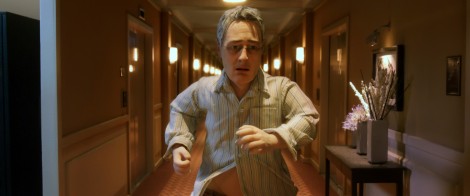
Charlie Kaufman’s adult stop-motion film is like a playground for his enigmatic mind, drawing out emotions that are difficult to describe. But I’ll try. The first R-rated movie to be nominated for the Best Animated Feature Oscar, Anomalisa uses the encounters of 3D printer-generated puppets to explore the human aspiration of connecting beyond cookie-cutter, obligatory relationships. Voiced by David Thewlis, a self-help author desperately looks for a way out of mundanity, wrought by the flood of individuals in his life who he perceives as one giant grey mass… and who are all voiced by Tom Noonan.
Yet his encounter with a quirky woman (voiced by Jennifer Jason Leigh) on a Cincinnati business trip only deepens our understanding of his isolation, why people choose to connect, and how we squander our preexisting relationships in favor of idealistic feelings or experiences that we hopelessly try to regain. Anomalisa is an experience of its own, beautiful, hilarious, strange, heartbreaking, and eerily on-point in its depiction of both banal interaction and yearning for connectivity. And having raised its budget through online crowdfunding, it’s an example of a deeply experimental film generated outside of the studio system that has still been resonant enough to receive mass recognition. Anomalisa also represents a gateway toward the possibilities of adult, theatrically distributed animation. It really is a trip.
3. The Revenant
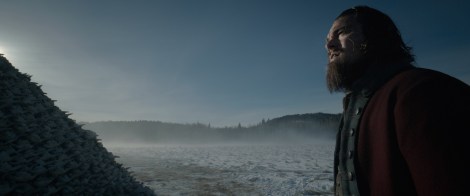
An art film that never forgets its goal to serve as a thoroughly entertaining cinematic experience, Alejandro G. Iñárritu’s follow-up to Birdman once again uses Emmanuel Lubezki’s gorgeously fluid cinematography to plant us within a particular space. Yet here, we are transported to an unforgiving wilderness, populated by the hostile encounters of American and French frontiersman with Native American tribes, all fighting for some form as survival. Meanwhile, life manages to find a way through nature, sometimes giving to these men, sometimes harming them, but always advancing onward. Always surviving.
Leonardo DiCaprio, as the scout left for dead by Tom Hardy’s deplorable hunter, gives the performance of the year in a role that places him on the very fringes of human existence. Driven by primal emotions, the credibility of such we see in his eyes during every shot, we’re asked to examine whether it are these uniquely human emotions that enable him to continue living, even if they may be rooted in revenge. It is his process, as it is the process of ants to form a living raft. Surely, if this enables his survival, it cannot be wrong? But he is also driven by bonds beyond death, something uniquely available to his kind, along with the powers granted by love. These also contribute to his survival. And perhaps, to truly live in a distinctively human way, so must the ability of choice.
A singular, visual achievement, with vivid emotions that bleed through every frame, Iñárritu has made a film of epic scope and vision, only occasionally marred by b-movie dialogue, Malick-lite moments, and thematic inconsistency. But even these elements seem only to add to its strange captivation, as the Herzog-esque journey of bringing a camera into unknown terrain is rendered on the flip-side as an experience flawed out of necessity, at times beautiful and ugly, that we share with these characters. We’re right there, and after the credits roll, we carry their passions beyond the screen. The word revenant is defined as “a person who returns.” The same could be said for the film, reentering your thoughts like a luring specter.
4. Carol
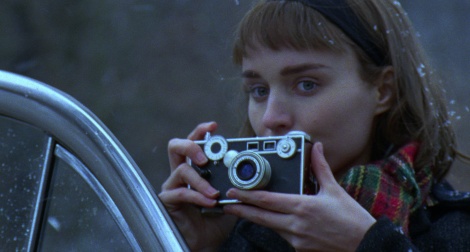 Phyllis Nagy’s novel is brought to ravishing life, harkening back to the best work of Douglas Sirk, in a romance that is as effectual as it is beautifully realized onscreen. Rooney Mara and Cate Blanchett are breathtaking, as is the period production design circa Manhattan 1952, in Todd Haynes’ film version of Carol, where each dramatic moment is felt like a warm-bodied presence in the room.
Phyllis Nagy’s novel is brought to ravishing life, harkening back to the best work of Douglas Sirk, in a romance that is as effectual as it is beautifully realized onscreen. Rooney Mara and Cate Blanchett are breathtaking, as is the period production design circa Manhattan 1952, in Todd Haynes’ film version of Carol, where each dramatic moment is felt like a warm-bodied presence in the room.
The film captures love amidst doubt, and presents the notion that with all the uncertainty and irrationality that pervades life, the choice to pursue what makes us feel whole is constantly present; testing us, waiting for our response. In Haynes’ period piece, this choice is made all the more difficult by pressures from the surrounding world, beautifully captured in 16 mm. The characters’ muddled passion, kept under wraps out of presumed necessity, fuels each scene with miraculous humanity. It captures a not-too-distant past, and beckons toward an optimistic future that is just now unfolding. The choice to accept it is, as always, right before one’s eyes.
5. Beasts of No Nation
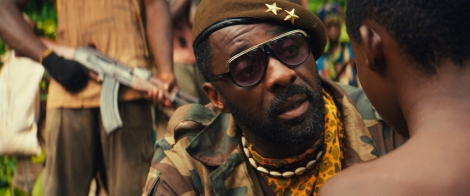
The atrocities experienced by a West African child solider, Anu, in the Cary Joji Fukunaga-directed Beasts of No Nation, are soul-crushing enough to put you down for weeks. Then why expose yourself to this movie? Because it’s one the most important, angry cryings of “this exists” to arrive on screens this year. Some have argued the film as exploitative, citing its lack of clarification regarding the setting, conflict, and supporting characters as proof that the movie is manipulating African conflicts to invoke white, Western gasps and shaking of heads, guised within a technically competent and powerful movie experience. They’re right about the last part.
Anu (played in a breakthrough debut performance by Abraham Attah) only knows his world, he has no basis for outside clarification or context. The film captures his world smashing into oblivion. And as the horrific events in this film unfold from Anu’s perspective, as his young psyche is manipulated by Idris Elba’s tremendously performed Commandant and corrupted by war’s endless spiral of suffering, the heartbreak is genuine, the experience sobering. The gorgeous cinematography, shot by Fukunaga himself, does nothing to distract us from Anu’s hell, but rather enhances the surreality and “otherness” of the circumstances that cripple this boy’s youth. We never once believe he doesn’t exist.
6. Spotlight
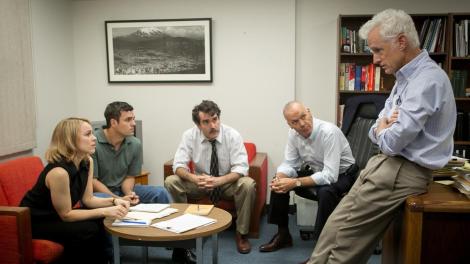
Imagine all the genuine moments of your high school newspaper advisor explaining the importance of investigative journalism, translated to the screen in a manner that brings to life one of the most important news pieces you’ve ever read. Spotlight enacts this idea, in a much more entertaining way than I’ve described, with a terrific ensemble cast (Mark Ruffalo gives what might be his best performance) that plays The Boston Globe‘s “Spotlight” team, as they break child sex abuse cases tied to the highest tiers of the Catholic Church in 2001.
Journalistic in style, Tom McCarthy directs the film in a way that refuses to depict its investigators as heroes, instead focusing on the importance of journalism to serve and inform communities. The manner in which the pieces come together, and in which this particular “story” effects both the informers and readers (along with their struggle against corrupt authority) is taut drama with real-life stakes. Spotlight presents the facts and asks you to derive your own conclusions. And of all the reasons it’s important, that’s just the lead.
7. Steve Jobs
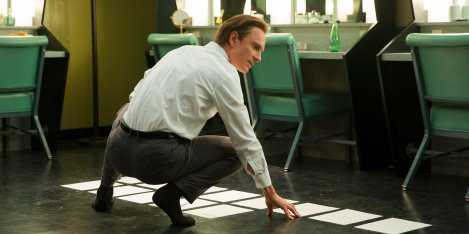 Does it take a man with a soul to make a machine with (something resembling) one? In this unconventional biopic, that somehow most iPhone-owning Americans didn’t see, the flawed and fascinating man who dramatically altered the manner in which we communicate and create is brought to astonishing life by Michael Fassbender.
Does it take a man with a soul to make a machine with (something resembling) one? In this unconventional biopic, that somehow most iPhone-owning Americans didn’t see, the flawed and fascinating man who dramatically altered the manner in which we communicate and create is brought to astonishing life by Michael Fassbender.
And cutting to the core of Walter Isaacson’s biography with a brilliant three-act structure, Danny Boyle’s adaptation of the most Sorkin-y of Aaron Sorkin scripts successfully executes the concept of whether a man judged on the basis of his great products can measure up as a “great” man, when we are shown how he addresses his relationships; these, of course, happen to encompass incredible tension before three of the most crucial technology launches of Jobs’ career. Alongside Fassbender, Kate Winslet also nails it, disappearing into her role with remarkable confidence. The film ultimately captures Jobs’ most crucial innovation, that which redeems him as a human being. You’ll want to carry it around in your pocket.
8. Room
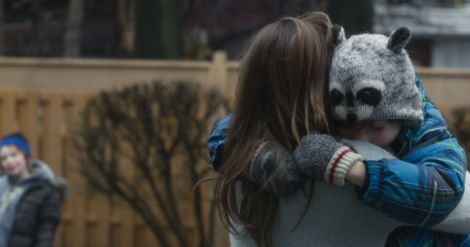 Unexpected and wholeheartedly moving, Room is a treasure. Focusing on the enduring love between a mother and child, from captivity to the outside world, Lenny Abrahamson’s adaptation of Emma Donoghue’s novel and screenplay visually depicts how life would look to a young child raised within a single space, but then suddenly exposed to all the sights and sounds of life at large. It’s a daunting feat that’s somehow accomplished, while the opening of both characters’ minds is an emotionally exhilarating experience. This wouldn’t work without the superbly believable performances of Brie Larson and Jacob Tremblay, whose characters awaken to the understanding that both mother and son need each other for different reasons, enclosed or otherwise.
Unexpected and wholeheartedly moving, Room is a treasure. Focusing on the enduring love between a mother and child, from captivity to the outside world, Lenny Abrahamson’s adaptation of Emma Donoghue’s novel and screenplay visually depicts how life would look to a young child raised within a single space, but then suddenly exposed to all the sights and sounds of life at large. It’s a daunting feat that’s somehow accomplished, while the opening of both characters’ minds is an emotionally exhilarating experience. This wouldn’t work without the superbly believable performances of Brie Larson and Jacob Tremblay, whose characters awaken to the understanding that both mother and son need each other for different reasons, enclosed or otherwise.
9. Ex Machina
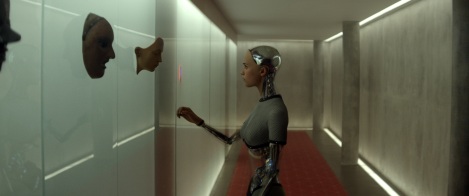
Alex Garland’s Ex Machina avoids the science-fiction cliché of “what it means to be human” by asking, if a real A.I. were to be created, whether that question would ever be relevant again. A post-modern Frankenstein if there ever was one, the film studies the implications of gender roles in the era of Google and Apple, where the passed Turing test of an android named Ava could represent a giant leap into the moral abyss. It’s intelligent sci-fi that, while dark and moody, is uncommonly fun and engaging. Featuring awesome performances from what is nearly a three-person cast, Domhnall Gleeson, Alicia Vikander, and Oscar Isaac play a minimalist game of gods, men, and robots with tragic(?) implications. The trick is that you have to judge for yourself.
10. It Follows
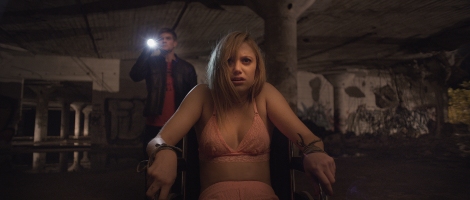
Growing up is scary. Especially when it’s symbolized by an ubiquitous sex demon that follows you slowly, uncompromisingly, no matter which corner you turn around. As a group of young adults struggle to shake it, their only option is to continue spreading what trails them, via sexual encounters that beg the question of why we form relationships in the first place. Reaching an age where decisions of companionship feel forced, a period of innocent hormonal confusion suddenly leads into fixed compromise.
Death lingers outside the bedroom door. But can it be fooled?
Successfully co-mingling an intelligent horror film with a coming-of-age drama, David Robert Mitchell’s indie shocker is frightening and alluring, a piece that nostalgically recaptures ’70s horror while beckoning toward a new era of smart, cool, low-budget genre movies that can find their way into wide release. It’s crafty and thematically dense, featuring scenes in decrepit Detroit that will send chills down your spine. One of the best horror movies of the new century, It Follows is as unsettling because of its ideas as its atmosphere, expressive execution, and jarring moments of terror.
It latches on.
More of the best…
The Assassin, The Big Short, Bridge of Spies, Brooklyn, Chi-Raq, The End of the Tour, Goodnight Mommy, Hard to Be a God, The Hateful Eight, Inside Out, Kurt Cobain: Montage of Heck, Listen to Me Marlon, Love & Mercy, Macbeth, Phoenix, Queen of Earth, Sicario, Tangerine

I loved Mad Max and am keen to see Anomalisa and Spotlight! A good list (although mine is different because of australian release dates) Would appreciate if you could check it out at: http://scribblesofstageandscreen.com/2016/02/03/my-top-10-films-of-2015/
Thanks so much! Excited to check it out.